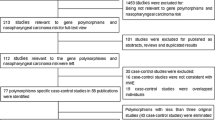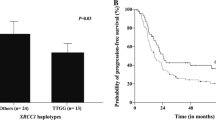Abstract
The X-ray repair cross-complementing group 3 (XRCC3) Thr241Met polymorphism (rs861539, C > T) has drawn wide attentions as its association with cancer risk and its involvement in DNA repair. Several studies have attempted to link rs861539 to nasopharyngeal cancer (NPC) risk; however, the sample sizes of these studies are small and the results are controversial. To investigate the relationship of rs861539 and NPC susceptibility, we conducted a large-scale case-control study involving 4001 NPC cases and 2967 controls of southern Chinese. Logistic regression analysis revealed significant association for rs861539 and NPC risk under the recessive model (TT vs. CT + CC) with adjustment of age and gender (odds ratio, OR = 2.72; 95 % CI 1.10–6.72; P = 0.03). Further, meta-analysis involving 4457 NPC cases and 4132 controls from four studies showed consistent association of TT carriers and NPC risk (OR = 3.12; 95 % CI 1.58–6.13; P = 0.001). Taken together, our findings based on large-scale sample size suggested rs861539 at XRCC3 to be associated with NPC risk through recessive model.


Similar content being viewed by others
References
McDermott AL, Dutt SN, Watkinson JC. The aetiology of nasopharyngeal carcinoma. Clin Otolaryngol Allied Sci. 2001;26(2):82–92.
Wei KR, Zheng RS, Zhang SW, Liang ZH, Ou ZX, Chen WQ. Nasopharyngeal carcinoma incidence and mortality in China in 2010. Chin J Cancer. 2014;33(8):381–7. doi:10.5732/cjc.014.10086.
Bei JX, Jia WH, Zeng YX. Familial and large-scale case-control studies identify genes associated with nasopharyngeal carcinoma. Semin Cancer Biol. 2012;22(2):96–106. doi:10.1016/j.semcancer.2012.01.012.
Hildesheim A, Wang CP. Genetic predisposition factors and nasopharyngeal carcinoma risk: a review of epidemiological association studies, 2000–2011: Rosetta Stone for NPC: genetics, viral infection, and other environmental factors. Semin Cancer Biol. 2012;22(2):107–16. doi:10.1016/j.semcancer.2012.01.007.
Goode EL, Ulrich CM, Potter JD. Polymorphisms in DNA repair genes and associations with cancer risk. Cancer Epidemiol Biomark Prev. 2002;11(12):1513–30.
Qin HD, Shugart YY, Bei JX, Pan QH, Chen L, Feng QS, et al. Comprehensive pathway-based association study of DNA repair gene variants and the risk of nasopharyngeal carcinoma. Cancer Res. 2011;71(8):3000–8. doi:10.1158/0008-5472.CAN-10-0469.
Chen S, Zhu JH, Wang F, Huang SY, Xue WQ, Cui Z, et al. Association of the Asp312Asn and Lys751Gln polymorphisms in the XPD gene with the risk of non-Hodgkin’s lymphoma: evidence from a meta-analysis. Chin J Cancer. 2015;34(3):108–14. doi:10.1186/s40880-015-0001-2.
He J, Shi TY, Zhu ML, Wang MY, Li QX, Wei QY. Associations of Lys939Gln and Ala499Val polymorphisms of the XPC gene with cancer susceptibility: a meta-analysis. Int J Cancer. 2013;133(8):1765–75. doi:10.1002/ijc.28089.
Xue WQ, He YQ, Zhu JH, Ma JQ, He J, Jia WH. Association of BRCA2 N372H polymorphism with cancer susceptibility: a comprehensive review and meta-analysis. Sci Rep. 2014;4:6791. doi:10.1038/srep06791.
He J, Wang F, Zhu J, Zhang R, Yang T, Zou Y, et al. Association of potentially functional variants in the XPG gene with neuroblastoma risk in a Chinese population. J Cell Mol Med. 2016. doi:10.1111/jcmm.12836.
Zhu ML, He J, Wang M, Sun MH, Jin L, Wang X, et al. Potentially functional polymorphisms in the ERCC2 gene and risk of esophageal squamous cell carcinoma in Chinese populations. Sci Rep. 2014;4:6281. doi:10.1038/srep06281.
Du L, Xiong T, He Q, Wang Y, Shen J, Peng Y, et al. The Thr241Met polymorphism in the XRCC3 gene is associated with increased risk of cancer in Chinese mainland populations. Tumour Biol. 2014;35(2):1371–6. doi:10.1007/s13277-013-1187-z.
Bashir H, Majid S, Hamid R, Farooq R, Wani HA, Shoib S, et al. Polymorphism of the XRCC3 gene and risk of gastric cancer in a Kashmiri population: a case-control study. Eur J Cancer Prev. 2015;24(3):167–75. doi:10.1097/CEJ.0000000000000115.
Liu C, Wang H. XRCC3 T241 M polymorphism is associated risk of hepatocellular carcinoma in the Chinese. Tumour Biol. 2013;34(4):2249–54. doi:10.1007/s13277-013-0765-4.
Ma Q, Zhao Y, Wang S, Zhang X, Zhang J, Du M, et al. Genetic polymorphisms of XRCC3 Thr241Met (C18067T, rs861539) and bladder cancer risk: a meta-analysis of 18 research studies. Tumour Biol. 2014;35(2):1473–80. doi:10.1007/s13277-013-1203-3.
Liu JC, Tsai CW, Hsu CM, Chang WS, Li CY, Liu SP, et al. Contribution of double strand break repair gene XRCC3 genotypes to nasopharyngeal carcinoma risk in Taiwan. Chin J Physiol. 2015;58(1):64–71. doi:10.4077/CJP.2015.BAD279.
Brenneman MA, Weiss AE, Nickoloff JA, Chen DJ. XRCC3 is required for efficient repair of chromosome breaks by homologous recombination. Mutat Res. 2000;459(2):89–97.
Manuguerra M, Saletta F, Karagas MR, Berwick M, Veglia F, Vineis P, et al. XRCC3 and XPD/ERCC2 single nucleotide polymorphisms and the risk of cancer: a HuGE review. Am J Epidemiol. 2006;164(4):297–302. doi:10.1093/aje/kwj189.
Lindh AR, Rafii S, Schultz N, Cox A, Helleday T. Mitotic defects in XRCC3 variants T241M and D213N and their relation to cancer susceptibility. Hum Mol Genet. 2006;15(7):1217–24. doi:10.1093/hmg/ddl037.
Pierce AJ, Johnson RD, Thompson LH, Jasin M. XRCC3 promotes homology-directed repair of DNA damage in mammalian cells. Genes Dev. 1999;13(20):2633–8.
Yang ZH, Du B, Wei YS, Zhang JH, Zhou B, Liang WB, et al. Genetic polymorphisms of the DNA repair gene and risk of nasopharyngeal carcinoma. DNA Cell Biol. 2007;26(7):491–6. doi:10.1089/dna.2006.0537.
Zhang YMYE, Wang HM, Shi YS, Cheng L. The association between single nucleotide polymorphisms of xrcc3 gene thr241met (rs861539) site and nasopharyngeal carcinoma susceptibility (Chinese). Shi Yong Yi Xue Za Zhi. 2012;2012(28):2684–6.
Li J, Zou X, Wu YL, Guo JC, Yun JP, Xu M, et al. A comparison between the sixth and seventh editions of the UICC/AJCC staging system for nasopharyngeal carcinoma in a Chinese cohort. PLoS One. 2014;9(12):e116261. doi:10.1371/journal.pone.0116261.
Mychaleckyj JC, Farber EA, Chmielewski J, Artale J, Light LS, Bowden DW, et al. Buffy coat specimens remain viable as a DNA source for highly multiplexed genome-wide genetic tests after long term storage. J Transl Med. 2011;9:91. doi:10.1186/1479-5876-9-91.
Court MH. Court’s (2005–2008) online calculator. Tuft University Web site. 2012.
Frenkel K. Carcinogen-mediated oxidant formation and oxidative DNA damage. Pharmacol Ther. 1992;53(1):127–66.
Dodd LE, Sengupta S, Chen IH, den Boon JA, Cheng YJ, Westra W, et al. Genes involved in DNA repair and nitrosamine metabolism and those located on chromosome 14q32 are dysregulated in nasopharyngeal carcinoma. Cancer Epidemiol Biomark Prev. 2006;15(11):2216–25. doi:10.1158/1055-9965.EPI-06-0455.
Matullo G, Palli D, Peluso M, Guarrera S, Carturan S, Celentano E, et al. XRCC1, XRCC3, XPD gene polymorphisms, smoking and (32)P-DNA adducts in a sample of healthy subjects. Carcinogenesis. 2001;22(9):1437–45.
Xu J, Turner A, Little J, Bleecker ER, Meyers DA. Positive results in association studies are associated with departure from Hardy-Weinberg equilibrium: hint for genotyping error? Hum Genet. 2002;111(6):573–4.
Tiret L, Cambien F. Departure from Hardy-Weinberg equilibrium should be systematically tested in studies of association between genetic markers and disease. Circulation. 1995;92(11):3364–5.
Attia J, Thakkinstian A, McElduff P, Milne E, Dawson S, Scott RJ et al. Detecting genotyping error using measures of degree of Hardy-Weinberg disequilibrium. Stat Appl Genet Mol Biol. 2010;9:Article 5. doi:10.2202/1544-6115.1463.
Winsey SL, Haldar NA, Marsh HP, Bunce M, Marshall SE, Harris AL, et al. A variant within the DNA repair gene XRCC3 is associated with the development of melanoma skin cancer. Cancer Res. 2000;60(20):5612–6.
Jacobsen NR, Nexo BA, Olsen A, Overvad K, Wallin H, Tjonneland A, et al. No association between the DNA repair gene XRCC3 T241M polymorphism and risk of skin cancer and breast cancer. Cancer Epidemiol Biomarkers Prev. 2003;12(6):584–5.
Kuschel B, Auranen A, McBride S, Novik KL, Antoniou A, Lipscombe JM, et al. Variants in DNA double-strand break repair genes and breast cancer susceptibility. Hum Mol Genet. 2002;11(12):1399–407.
Mort R, Mo L, McEwan C, Melton DW. Lack of involvement of nucleotide excision repair gene polymorphisms in colorectal cancer. Br J Cancer. 2003;89(2):333–7. doi:10.1038/sj.bjc.6601061.
Liu L, Miao L, Ji G, Qiang F, Liu Z, Fan Z. Association between XRCC1 and XRCC3 polymorphisms and colorectal cancer risk: a meta-analysis of 23 case-control studies. Mol Biol Rep. 2013;40(6):3943–52. doi:10.1007/s11033-012-2471-5.
Jacobsen NR, Raaschou-Nielsen O, Nexo B, Wallin H, Overvad K, Tjonneland A, et al. XRCC3 polymorphisms and risk of lung cancer. Cancer Lett. 2004;213(1):67–72. doi:10.1016/j.canlet.2004.04.033.
Bei L, Xiao-Dong T, Yu-Fang G, Jian-Ping S, Zhao-Yu Y. DNA repair gene XRCC3 Thr241Met polymorphisms and lung cancer risk: a meta-analysis. Bull Cancer. 2015;102(4):332–9. doi:10.1016/j.bulcan.2015.02.003.
Ding G, Xu W, Hua H, Huang Q, Liang H, Ni Y, et al. Comprehensive assessment of the association between DNA repair gene XRCC3 rs861539 C/T polymorphism and lung cancer risk. Tumour Biol. 2013;34(5):2521–7. doi:10.1007/s13277-013-0705-3.
Tsai CW, Chang WS, Liu JC, Tsai MH, Lin CC, Bau DT. Contribution of DNA double-strand break repair gene XRCC3 genotypes to oral cancer susceptibility in Taiwan. Anticancer Res. 2014;34(6):2951–6.
Zhang EJ, Cui ZG, Xu ZF, Duan WY, Huang SH, Tan XX, et al. Lack of influence of an XRCC3 gene polymorphism on oral cancer susceptibility: meta-analysis. Asian Pac J Cancer Prev. 2014;15(23):10329–34.
Cirulli ET, Goldstein DB. Uncovering the roles of rare variants in common disease through whole-genome sequencing. Nat Rev Genet. 2010;11(6):415–25. doi:10.1038/nrg2779.
Taylor JC, Martin HC, Lise S, Broxholme J, Cazier JB, Rimmer A, et al. Factors influencing success of clinical genome sequencing across a broad spectrum of disorders. Nat Genet. 2015;47(7):717–26. doi:10.1038/ng.3304.
Mancuso N, Rohland N, Rand KA, Tandon A, Allen A, Quinque D, et al. The contribution of rare variation to prostate cancer heritability. Nat Genet. 2016;48(1):30–5. doi:10.1038/ng.3446.
Acknowledgments
This work was supported by the National Basic Research Program of China (2011CB504302), the National Natural Science Foundation of China (81222035), and the National Natural Science Foundation of China (81430059). We thanked all the participants in our study and appreciated the contributions of the staffs from the biobank at the Sun Yat-sen University Cancer Center.
Author contributions
Jin-Xin Bei and Yi-Xin Zeng conceived and designed the experiments; Qian Cui performed the experiments; Qian Cui and Xiao-Yu Zuo analyzed the data; Qi-Sheng Feng, Yun-Fei Xia, Wei-Hua Jia, Li-Zhen Chen and Hai-Qiang Mai contributed reagents and materials; Qian Cui, Jin-Xin Bei, Yi-Fan Lian and Cai-Yun He wrote the paper.
Author information
Authors and Affiliations
Corresponding authors
Ethics declarations
All subjects were self-reported residing in Guangdong province in south China, which is NPC prevalent area. Informed consent was obtained and the study was approved by the Ethics Committee of SYSUCC.
Conflicts of interest
None.
Additional information
Qian Cui and Xiao-Yu Zuo equally contributed to the work.
Yi-Xin Zeng and Jin-Xin Bei jointly supervised the work.
Rights and permissions
About this article
Cite this article
Cui, Q., Zuo, XY., Lian, YF. et al. Association between XRCC3 Thr241Met polymorphism and nasopharyngeal carcinoma risk: evidence from a large-scale case-control study and a meta-analysis. Tumor Biol. 37, 14825–14830 (2016). https://doi.org/10.1007/s13277-016-5300-y
Received:
Accepted:
Published:
Issue Date:
DOI: https://doi.org/10.1007/s13277-016-5300-y




